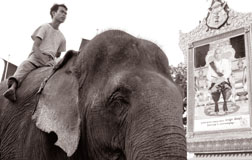|
DAILY NEWS ONLINE |
|
|
|
OTHER EDITIONS |
|
|
|
|
|
|
|
|
|
OTHER LINKS |
|
|
|
|
|
|
 |
|
|
|
|
Meanwhile, in a somewhat contrasting development, Nepal's Maoist rebels are accused by the country's military of abducting for the purpose of indoctrination and induction into its combat ranks, hundreds of Nepalese schoolchildren - a grim reminder of the degree to which this South Asian state has been dehumanisingly militarised.
Interestingly, both Cambodia and Nepal are headed by monarchs, who have been - more or less - enjoying titular status. This point needs to be made with some reservations because Nepal's monarch has demonstrated in clear, dramatic terms recently that he still exercises substantial political power; even going to the extent of dismissing democratically-elected governments and suspending the country's constitution.
This act is proof that the Nepalese monarchy is refusing to remain confined within its titular figure head status. Real power continues to remain with the king and this is a key factor in the on-going Maoist rebellion, which also feeds on widespread poverty, caste and minority oppression.
Put briefly, the Maoists demand a republican form of government which would see the people rather than the king exercising legislative and executive power, within, hopefully, an equitable dispensation.
Right now, there is no political turbulence in Cambodia which is even remotely reminiscent of that in Nepal but the country's king has been traditionally revered by the people and is looked up to as a veritable caring father figure.
Cambodia's new king, therefore, is pressed into the position of winning popular favour, for, in Cambodia's political order that is a source of legitimisation as far as the monarchy is concerned although real power doesn't any longer reside in the monarchy but in popular political institutions.
As to whether the Cambodian king would be forced into an overtly political role or not would depend on how ably the Cambodian regime succeeds in meeting the urgent needs and aspirations of the Cambodian masses. For, in the next round of political turbulence in Cambodia, based on popular grievances, the probability is great of the Cambodian public looking to the king to intervene directly in the affairs of the State and resolve seemingly unmanageable political disputes - an interesting reversal of the situation in Nepal.
An eye-opener for both states, however, comes from Sri Lanka where, we have it on the authority of the UNDP, that over five million of the country's population are living in poverty.
This is despite 25 years of economic liberalization and a proud boast of being the first state in South Asia to "open" its economy. Initial reports said that the UNDP's Millennium Development Goal's Report on Sri Lanka "spotlights the disparity in development and the growing poverty in inland rural areas and the coastal belt affected by the 26th December 2004 sea surges."
Therefore, whether it be Nepal, Cambodia or Sri Lanka, economic equity emerges as a prime factor in political stability. Balancing growth with equity remains a principal challenge for governments in the Third World.
A republican form of government is a distinct advance - of course - over a monarchy or an oligarchy but given the role that personalism plays in Third World politics, in times of political stress, some Third World publics may even regress to the position of valuing obsolete forms of government-such as monarchies - over governmental forms featuring popular participation. Such are the ironies of Third World politics.
|
|






